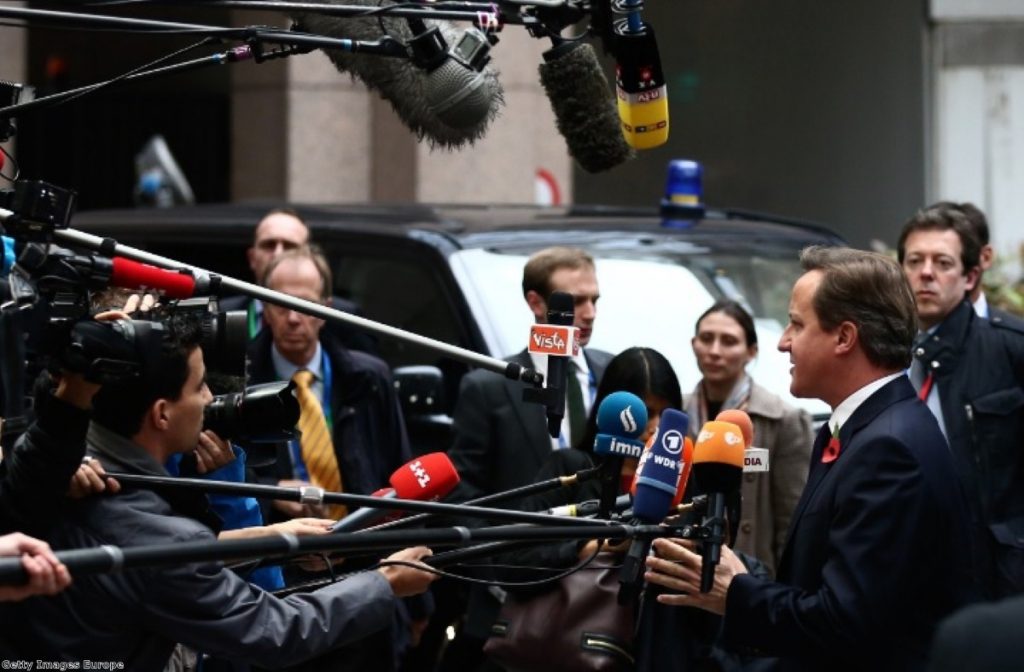A slap in the face: EU hits Cameron with shock £1.7bn bill
Out of nowhere the European Union has produced an eye-watering demand for £1.7 billion, payable on December 1st please. It's a minor catastrophe for David Cameron.
The bare bones of the story are irresistibly dramatic. Britain is being forced to pay a huge sum of money because its economy has done better than other European countries. France, using the same tweaked calculations of gross national income, is going to get a huge sum of money back.
This is a calamity for the PM. EU officials may be behind the technical move, but its political consequences far outweigh what is, ultimately, only an increase in Britain's annual budget payments of around one-fifth. The shock factor is significant here: Downing Street is suggesting it only heard about the possibility of this slap in the face last week.
Britain is in a fragile, emotional state when it comes to Europe. Right-wing forces in the UK are split over how to respond to the EU, a divide which could cost its politicians their jobs in government after next year's general election. Voters, perversely, have responded to the debate by firming up their support for Europe – despite handing Ukip victory in this year's European elections. So a lot of the heat generated from this latest unpleasant surprise may only have consequences within the Westminster bubble.


Yet there must be a strong chance the anger felt by our politicians could influence broader perceptions and help the Conservatives' cause. After all, it's pointed out, our net contribution to the EU has risen by over 200% in the last decade, but our economy has only grown by 14%. Last year Cameron negotiated hard to secure a 3.7% real-terms cut in Britain's payments to the EU – but now MEPs have voted to reverse the 0.44 billion euro reduction in overall payments this represents.
Take this comment from Matthew Elliott, chief executive of Business for Britain, which is a typical example of the howls of rage now emanating from the right:
"It's staggering that the UK is being punished by Brussels for making the correct decisions, such as staying out of the the euro, that have allowed our economy to grow. We seem to pay more and more into the EU's inflated budgets yet the main thing we get in return is just more red tape. David Cameron should categorically reject any attempts to get Britain to top up the EU's coffers and focus on securing a new, improved EU deal for the country. "
Yet these were the rules we signed up to. The Commission is perfectly within its rights to make these adjustments. Technically, the EU is being entirely reasonable.
What makes this so terrible for the prime minister is the ammunition it gives his eurosceptic enemies – both inside and outside his party.
The Rochester and Strood by-election was already looking like a done deal in favour of Ukip, with one poll putting defector Mark Reckless comfortably in the lead. Any slim hopes the Tories had of holding on to the seat may disappear as a result of this latest development, which Nigel Farage has already described as a "humiliation" for Cameron.
Meanwhile eurosceptic backbenchers are swarming. Bill Cash has called the proposal "madness on stilts". Peter Bone has called it a "total disgrace". Bernard Jenkin, offering a useful insight rather than just indignant spluttering, has said: "The EU punishes economic success and rewards profligacy and failure." John Baron has taken the opportunity to push Cameron towards another standoff with Brussels, saying: "Examples such as this illustrate that greater clarity as to the sort of Europe we want is needed."
The Govt has known about this EU budget issue for a week. They must work with others to get new Commission to look at this again.
— Pat McFadden (@patmcfaddenmp) October 24, 2014
PM once claimed that he'd reduced EU budget – but the UK contribution went up and now quite incredibly, our contribution goes up a 2nd time
— Nigel Farage (@Nigel_Farage) October 24, 2014
If Britain left the EU, the maximum TOTAL cost in tariffs – if no deal were struck – is the same as the EXTRA budget payment now demanded.
— Daniel Hannan (@DanHannanMEP) October 24, 2014
Next Monday the prime minister will come face to face with those backbenchers – well, sort of – when he answers their questions at the despatch box. Right now No 10 seems dismayed and taken aback. It will have to do its best to turn this setback into an opportunity: Cameron's advisers will feel they have no choice but to urge him towards another damaging row with Europe.
By coincidence, today also sees the publication of a poll from YouGov for the Times newspaper which suggests voters think Cameron is shifting to the right. Only three per cent said he was moving to the left, compared to 33% thinking his direction of travel was the other way.
Ukip's presence, defined by its two by-elections, has pushed Cameron into putting forward an ugly set of proposals on immigration. Now he is being pushed towards clamping down on Europe against his wishes.
Great leaders, it is said, use the sheer force of their political personality to shape events. That cannot be said of Cameron. His malleable political identity suggests it is events that are shaping him.












